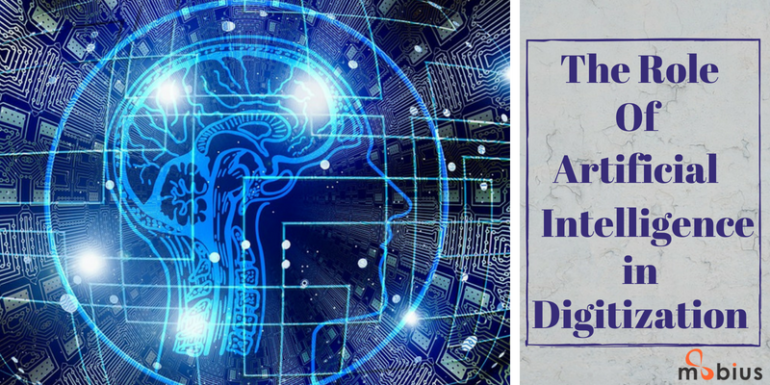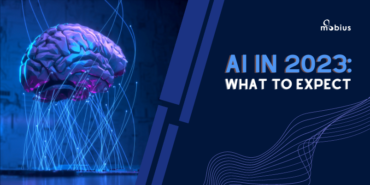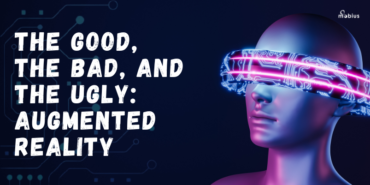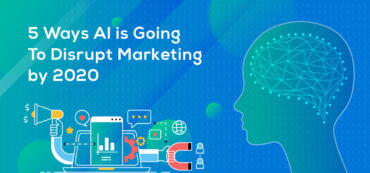Global economy is transforming into a digital economy.
What started out as an idea with potential, has now turned out to be a powerful force that has disrupted all industries across the globe.
Today, more companies are using and becoming familiar with the implementation of Artificial Intelligence in their digital transformation processes as it has proven to have great potential for growth.
The dependence of digital transformation on AI is of utmost importance as it can help companies accelerate their Digitization processes. Artificial Intelligence is waiting in unsuspicious serenity, to pounce at us as the next disruptive technology.
Although digitally mature, larger businesses have been known to adopt AI in their core activities, any brand, firm or government undergoing the Digitization process, can tap into the potential of AI to make their digital transformation smoother, faster and much more efficient.
Making Automation Intelligent
When it comes to automation and Digitization, it’s not just about following the industry trends blindly. Large assets of the company are at stake, colossal efforts are required by the management, expensive resources are used and a company may bring in global experts to fabricate the most efficient strategy that it could find.
AI and ML are already shaking up the world by breaking through all industries in the world, bringing in effects that are only becoming more and more pronounced with each passing day.
The smart companies are gaining a stark competitive advantage by integrating AI in their digital transformation
Artificial Intelligence – the upcoming digital milestone
When it comes to Digitization through adopting AI, bigger is always bolder. Researches have shown with solid evidence that the companies that are quickly adopting AI into their business solutions, have shown ten folds of better results than companies that are slow and experimental with adopting AI – simply because early adopters tend to become serial adopters.
AI has to be included in the complete cycle of digital transformation. While undertaking AI powered digital transformation, companies have to remember that they can’t take up AI just in the beginning or the end of the process. Using AI in the improvement of human efficiency
The worldwide management consulting firm, McKinsey recently published a few industry case studies that demonstrated the disruptive potential of AI and their report suggests that firms that combine strong digital capabilities with robust AI adoption, and a proactive AI strategy see outsize financial performance.
Digitizing Healthcare
Artificial Intelligence makes healthcare systems more productive.
There are several examples and several ways through which the healthcare industry can exploit AI in order to make their digitization processes quicker, and at the same time, bring faster results.
When one thinks of AI in Digitization, scanning of medical reports, and pharmaceutical documents are all that come at the top of our mind. However, Digitization of healthcare is so much more than that. It includes designing digital tools like Babylon and GP at Hand, which take all elements of a mental health professional, convert it to an app in your phone and offer just as effective results.
Having access to a wide range of medical practitioners and top notch encryption techniques, incorporating AI in the digital transformation of the healthcare industry can resolve a patient’s critical questions of privacy when it comes to their physical or mental health data.
AI has shown to enable preventive medicine as well. AI powered health apps enable health-care providers to dramatically accelerate the shift toward personalized preventive medicine.
In short, AI makes healthcare superhuman and more trustworthy.
Digitizing Fintech
Financial services and capital markets are in the brink of a major transformation. This type of revolution that the fintech industry is going to go through was only last seen during the era of computers and the internet.
This new age of game changing technology in financial services industry was seen to emerge in early 2017, and it has strengthened significantly in 2018. The AI skills that will be most sought after in the digital transformation process of the fintech industry would be adaptive software development; speech and face recognition; artificial neural networks; pattern recognition; deep learning; and Big Data.
One major concern as far as Fintech users are concerned is that they keep artificial intelligence closer to their hearts. People tend to trust machine over human when it comes to protecting, and growing their hard earned money which is why AI has played such a disruptive role in the fintech industry.
As long as fintech is concerned, Artificial Intelligence will be at the forefront of this new wave of digital transformation.
Digitizing Retail
When the retail giants digitized their firms using AI, the found efficiency increasing multifold in each and every segment of the company.
Right from improving product design yield, automating supplier assessment and anticipating spare parts requirements in the manufacturing, to the automation of supplier selection, providing accurate insights on consumption, automating customer service in the logistics phase, Digitization of Retail is one the largest beneficiaries of A.I.
For example, at the project phase, we can anticipate demand trends, while optimising and automating supplier negotiations. AI powered Digitization will ensure the automation of warehouse and store operations while it simultaneously optimises functions like merchandising, product assortment and microspace.
They play an important role in revamping the promotional strategies too. They can help price products optimally, customise promotions, and make real time alterations and tailoring to store websites. With in store browsing, and omnichannel operations becoming inevitable needs for the current market, AI powered Digitization can give a crisp and seamless experience to the twenty first century shoppers.
Digitizing Education
Governments of both developed countries and emerging developing countries alike are focussing on making education digital.
It’s one of their primary agendas.
In India, for example, finance minister Arun Jaitley announced that the education sector will be receiving an incorporation of technology at every level so much so that the government plans to replace every blackboard with a digital board.
“Technology will be the biggest driver in improving the quality of education. We propose to increase the digital intensity in education and move gradually from ‘‘blackboard’’ to ‘‘digital board’’. Technology will also be used to upgrade the skills of teachers through the recently launched digital portal ‘DIKSHA’,” the minister commented.
Industry experts however, feel that the most of the push on the Digitization of education sector would depend on the incorporation of AI and ML into the process, in order to maximise the efficiency of the efforts taken.
Value creation through AI in Digitization
According to Mckinsey, there are four core areas across the value chain where AI can create value. Project, Production, Promotion and Providing. With the project area, AI can enhance a smarter R&D and a much more accurate forecasting. When it comes to the production, it helps with optimising the production and also having a seamless maintenance. In the promotions section, AI in Digitization can help marketers make a much more targeted sales and marketing strategy.
As an illustration to this example, let’s look at education
When it comes to Providing for the customers, AI in Digitization can help a brand or a firm give enhanced user experience.
A new wave of opportunities
Having said all this, we would like to emphasise on the fact that AI can offer significant competitive advantages – but ONLY for firms that are fully, wholeheartedly committed to it. In order to successfully embed AI, firms need to build capabilities, improve employee skill set, and embed a collaborative work culture. AI is not just about technical adoption, but also about the attitude of the board members of a company. Companies that have been successful AI adopters have shown executive leadership support, that came not only from the CEO or CTO, but also from all other C level officers and the board of directors as well.
In the end, in order to provide to be successful and fruitful, adopting AI in the digital transformation of a company needs accountability and interest from the executive suit. This is of critical importance as it will help generate the momentum needed to going the organisational inertia.
Leaders must remember that technology is just a tool and in itself does not deliver higher competence.







